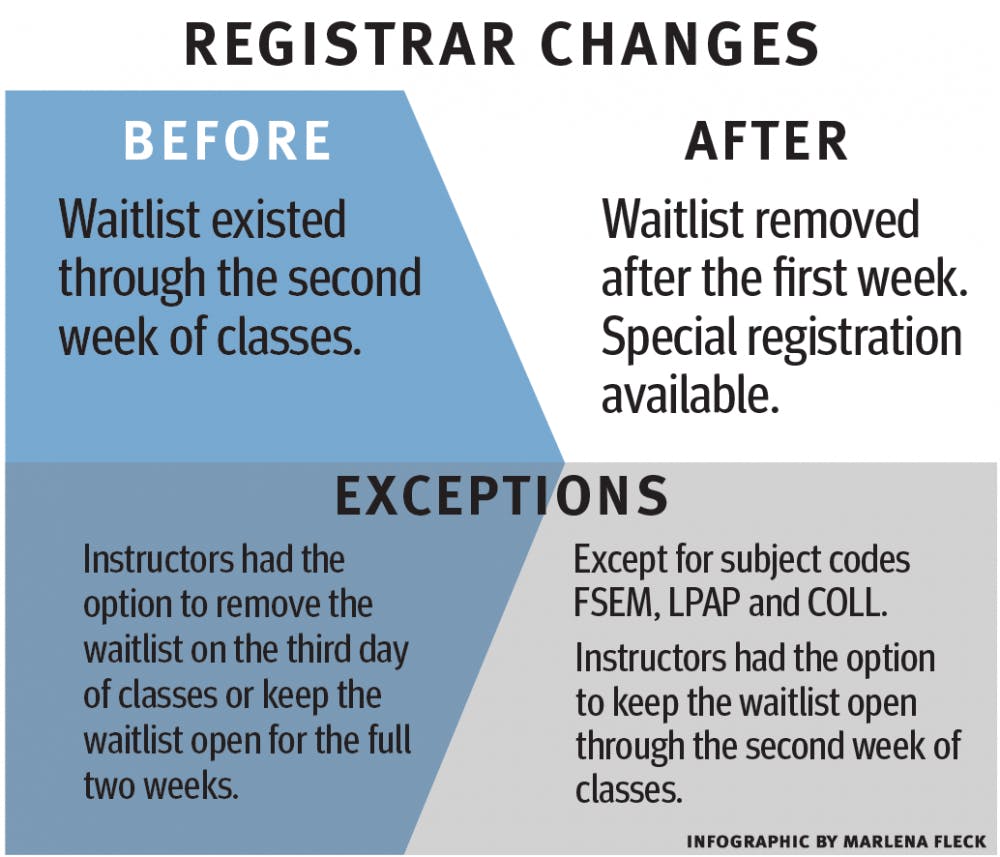Registrar removes waitlists after first week

ESTHER waitlists were removed after the first week of classes, with the exception of courses with FSEM, LPAP and COLL subject codes, although instructors could opt into keeping their waitlists open through the second week, according to the University Registrar David Tenney.
The Office of the Registrar, in collaboration with academic departments and instructors, instituted the changes starting in the 2018-19 academic year.
Prior to the change, an instructor whose course had an ESTHER waitlist had the option of removing the waitlist on the third day of classes or keeping the waitlist active until the end of the add/drop period, according to Associate Registrar Justin Schilke.“With a waitlist on a course, it is first-come first-serve; it cannot be prioritized,” Schilke said. “By purging all waitlists at the beginning of week two, this allows instructors to sign special registration forms for whoever they determine should get the course, including those who need the specific course to graduate.”
According to Schilke, the change affects a very small number of courses. Excluding LPAP and COLL courses, there were 3,632 course sections on the fall 2018 academic schedule and 459 courses that allowed students to waitlist if the desired course reached capacity. Of those courses, only 91 classes actually had students on a waitlist.
“This change could be important for those few students who need to get into a course to graduate when they otherwise might not have been able to do so,” Schilke said. “The percentage of total registrations off a waitlist is a tiny sliver of the overall picture. If history continues as it has, only a relatively small percent of those requests would actually result in registration during Week 2 of classes.”
Although the deadline for adding courses is the Friday of the second week of classes, some students are nonchalant with those ‘extra’ courses in their schedules that they intend to drop because the deadline for dropping courses is during the seventh week of classes, according to Tenney.
“If your plans change, and you determine that you will not start or stay in a class for which you’re registered, please log into ESTHER and drop it promptly,” Tenney said. “Every seat in a class is precious, and doing so makes the class available to someone else who needs that course to graduate or really wants to pursue knowledge in that area.”
According to sociology lecturer Craig Considine, before the change, instructors would often purge waitlists in order to incorporate as many people in the course as possible.
“I usually receive a handful of emails before classes start from people who want to ‘special register’ for the course,” Considine said. “In previous years, I had to message the registrar’s office to have them waived. It is helpful now that the waitlist is automatically dropped because it gives students who genuinely want to be in the class the opportunity to be there.”
Priscilla Huh, a Will Rice College sophomore, said the change was poorly communicated to the student body by the administration.
“I thought that it was so we could special register early, but when I went to get my special registration form signed, the professor told me that she cannot, and I just have to wait for someone to drop the class and hope that I can grab the spot before anyone else does,” Huh said. “I definitely feel that this was one of the poorest decisions Rice has made since I have been here.”
Professor of religious studies John Stroup said he approaches registration with the intention of encouraging as many people as possible to enroll in the courses he teaches.
“I have no other intent except to open my classes to as many people as possible and to do so as quickly as possible,” Stroup said. “If there is some way that I can admit a student, like with these changes, I try to follow that avenue.”
More from The Rice Thresher

Rice to support Harvard in lawsuit against research funding freeze
Rice, alongside 17 other research universities, filed an amicus curiae brief in support of Harvard University’s lawsuit against the Trump administration over more than $2 billion in frozen research grants.

Mayor Whitmire discusses ‘the state of Houston’ between audience protests at Baker Institute
John Whitmire’s remarks on the city’s budget, transportation and infrastructure were interrupted twice by shouts from audience members at a Baker Institute event May 29. At the event, which was open to the public, Whitmire spoke about the current state of Houston alongside former county judge Ed Emmett.
Rice reaffirms support for international students after Trump administration targets Harvard
Rice and the Office of International Students and Scholars said in a May 23 email that they are monitoring the Trump administration’s actions towards Harvard to bar the school from enrolling international students. A federal judge temporarily halted the move less than 24 hours later.


Please note All comments are eligible for publication by The Rice Thresher.